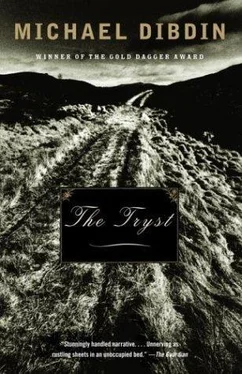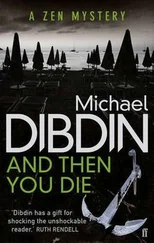Michael Dibdin - The Tryst
Здесь есть возможность читать онлайн «Michael Dibdin - The Tryst» весь текст электронной книги совершенно бесплатно (целиком полную версию без сокращений). В некоторых случаях можно слушать аудио, скачать через торрент в формате fb2 и присутствует краткое содержание. Жанр: Триллер, на английском языке. Описание произведения, (предисловие) а так же отзывы посетителей доступны на портале библиотеки ЛибКат.
- Название:The Tryst
- Автор:
- Жанр:
- Год:неизвестен
- ISBN:нет данных
- Рейтинг книги:4 / 5. Голосов: 1
-
Избранное:Добавить в избранное
- Отзывы:
-
Ваша оценка:
- 80
- 1
- 2
- 3
- 4
- 5
The Tryst: краткое содержание, описание и аннотация
Предлагаем к чтению аннотацию, описание, краткое содержание или предисловие (зависит от того, что написал сам автор книги «The Tryst»). Если вы не нашли необходимую информацию о книге — напишите в комментариях, мы постараемся отыскать её.
The Tryst — читать онлайн бесплатно полную книгу (весь текст) целиком
Ниже представлен текст книги, разбитый по страницам. Система сохранения места последней прочитанной страницы, позволяет с удобством читать онлайн бесплатно книгу «The Tryst», без необходимости каждый раз заново искать на чём Вы остановились. Поставьте закладку, и сможете в любой момент перейти на страницу, на которой закончили чтение.
Интервал:
Закладка:
Netherbourne Hall
Golden Age Sheltered Accommodation
Beneath this, a separate notice read ‘No Through Road’. Through the gates, Aileen could see an Elizabethan manor house with gables, mock crenellation, traceried windows and clusters of tall chimney-stacks, all in the local honey-coloured stone. It looked vaguely familiar. No doubt she had come here at some time with her parents, on a Sunday afternoon drive. Perhaps she could phone from there, she thought. If it was an old people’s home it couldn’t be strictly private. There would always be relatives coming to visit. The drive curved sinuously away to the right through fenced-off parkland where sheep were grazing. Clouds occasionally drifted over the sun, muting the colours and casting a cool dull spell over the scene. As Aileen got closer to the house, she began to feel uneasy about going in. They must be fed up with people sneaking around the place with some feeble excuse or other, taking pictures. But by now she had come so far that it would be quicker to detour across the lawn and try and find a way out to the village, which according to the signpost lay only half a mile away in that direction.
Even the Macklins’ next-door neighbour, the exacting Mr Griffiths, might have approved of the lawn, a magnificent expanse of grass trimmed in perfectly straight strips, except where circular flowerbeds had been planted around the stumps of two trees whose roots presumably went too deep for them to be removed without damage. Aileen strolled across it, glancing nervously at the grey stone facade of the house. She was afraid that at any moment one of the many windows would open with a bang and someone lean out and demand to know who she was and where she was going. Nothing of the sort happened, however. In a few moments she had reached the path, which led past the end of the opposite wing into a glade of enormous rhododendron plants. Beyond stood a small church, and Aileen decided to go in and have a look. Her mother knew every church for miles around, and if this one turned out to have a thirteenth-century font or a perfectly preserved hammerbeam roof Aileen would never hear the end of it. She was already starting to worry about what to say to her parents.
She walked through the lych-gate and up the path that curved past tumbling tombstones covered in elegant but largely illegible lettering. The porch was protected by a screen-door to keep out birds. This was open, but she wondered whether the church itself would be. So many were kept locked these days, a thing unheard of when she and her parents had done their tours. ‘The house of God is always open,’ she remembered her mother saying sententiously, and then making a disapproving noise when her husband added, ‘Unlike the public houses, alas.’ Aileen grasped the ring of braided iron set in the massive door and turned. There was a loud clack and the door swung back. The place smelt as ripely musty as a cellar. A pile of hymnals stood on a low table near the door, below a noticeboard displaying a photograph of a drought victim in Africa and a faded typewritten note explaining that a service was held there on the fourth Sunday of every alternate month.
She walked slowly around. The church had evidently been subject to some pretty brutal restoration, and its most striking feature was a set of memorials to the local gentry spanning some three hundred years. The earliest was a statue of an Elizabethan gentleman leaning on his elbow with an expression of fastidious boredom, as if death were the last in a long series of social duties which he had undertaken without enthusiasm or complaint. After that the style turned chilly and classical for a century or so, all marble urns and garlands, before Victorian earnestness took over. The last plaque, near the door, was a brass plate with incised red and black lettering. It commemorated two brothers: Rupert Jeffries, 1898–1916, Duke et decorum est pro patria mori , and Maurice Jeffries, 1898-, Et in Arcadia ego . The missing date seemed rather bizarre, as though suggesting that the person concerned might not really be dead. The little leaflet on the history of the church, which Aileen found on the table next to the hymnals and for which she was urged to make a contribution of ‘at least 6d’, proved unhelpful. It mentioned only that the Hall had been uninhabited for some time following the deaths of both heirs to the estate during the Great War and was now, ‘like so many of our great country houses, virtually derelict’. It was only when she made to put her contribution in the collecting box that Aileen realized that her purse was in the pocket of her coat, which she had left on the rack in the train.
Outside, the sky had clouded over quite considerably. It had grown almost uncomfortably close. The loss of her purse was a blow, for although it only contained about ten pounds, it was all she had with her. The attractions of this improvised day in the country were rapidly beginning to fade. She would have to find a phone box and make a reversed charge call, but first she had to find the way into the village. Regaining the path she had been on before, she came to another imposing set of gates leading out of the estate. Unlike the ones by which she had entered, however, these were locked and chained and clearly no longer in use. This was doubly frustrating, because she could see the rooftops of the village through the foliage beyond the gates, not more than a few hundred yards away. There was no way out, however. The alternatives were to return the way she had come, to take a narrow path to the right marked ‘Staff Only’, or to turn left up a track which skirted the wall of the estate. This seemed to offer the best possibility of finding a short cut to the village, and Aileen started along it.
The track was at first covered in gravel, but this soon gave way to a rough surface of dried mud, deeply rutted, with a strip of grass and wild flowers in the middle. The parkland surrounding the manor house gradually turned to rough meadow as the track had started to climb the open hillside. This proved surprisingly steep, and despite her impatience to get to a phone, Aileen found herself pausing frequently for breath, once even taking the opportunity to pick some overripe blackberries from the bushes in the ditching beside the track. The berries burst as she pulled them off, staining her fingers. Afterwards she wished she had left them alone, for she had nothing to wipe her hands on. It was already going to be difficult enough to come up with a story to tell her parents without making herself sound totally scatty. The last thing she needed was to turn up with her hands and dress apparently stained with blood. There was no sign of any path or road leading off to the village. The track ran straight ahead to the top of the hill. Aileen kept looking about her as she walked, hoping to find a bit of waste paper she could clean her hands on, but the only things she saw were useless to her: a work glove of some shiny red rubberized material lying palm up on the ground, and a large piece of torn plastic marked Gro-More, which had become trapped in the barbed-wire fencing and was flapping loudly in the wind. Finally she came to a dew-pond beside the track, a deep crater lined with black plastic sheeting. As she bent to wash the blackberry juice off her hands, she caught sight of her reflection in the water. She looked frail and fragile. The sleeveless white dress clung to her body like a shift. She put her hands into the water, blurring the image.
The land to either side grew barer and more exposed as she neared the crest of the hill. The traditional drystone walls had been swept away to create large efficient spaces for the cereal crop whose severed stalks covered the ground. Clouds of smoke started drifting across the track, light and tenuous at first, then suddenly thick, billowing and impenetrable. It looked as though some tremendous disaster had taken place. There were flames blended in with the smoke, orange turning to brown or brilliant red. The air was filled with their crackling. When the smoke thinned for a moment, Aileen saw figures running about with pitchforks, carrying smouldering straw to spread the blaze to the unburnt stubble. But they were too far away for her to ask for directions, and the next moment the wind changed direction, plunging her back into the smoke, which grew so thick that she could only see intermittently. When the smoke finally cleared, Aileen paused to take stock of her situation. The track she was on looked like one of the old drove-roads which continued for miles across the hills without passing any human habitation. The clouds were getting thicker and darker every moment: it was pretty obviously going to pour with rain in the not-too-distant future. About fifty yards further on there was a farmhouse standing beside the track, and rather than walking all the way back again, Aileen decided to go and ask for directions. They might know of a footpath down to the village, or even have a phone she could use. As the building grew nearer, Aileen was surprised to see how impressive it was for an outlying tenant farm. It had three storeys, with large gables, and was built of the local stone, richly mottled with lichen. Even more surprising, it appeared to be derelict. A new corrugated iron barn had been erected nearby and was being used to store various pieces of farm machinery, but the house itself seemed to be abandoned. The garden was a wilderness, several of the windows were smashed and the front door stood open.
Читать дальшеИнтервал:
Закладка:
Похожие книги на «The Tryst»
Представляем Вашему вниманию похожие книги на «The Tryst» списком для выбора. Мы отобрали схожую по названию и смыслу литературу в надежде предоставить читателям больше вариантов отыскать новые, интересные, ещё непрочитанные произведения.
Обсуждение, отзывы о книге «The Tryst» и просто собственные мнения читателей. Оставьте ваши комментарии, напишите, что Вы думаете о произведении, его смысле или главных героях. Укажите что конкретно понравилось, а что нет, и почему Вы так считаете.












